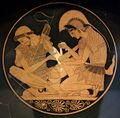Iliad (nonfiction): Difference between revisions
No edit summary |
No edit summary |
||
| (10 intermediate revisions by the same user not shown) | |||
| Line 1: | Line 1: | ||
'''The Iliad''' (/ˈɪliəd/; Ancient Greek: Ἰλιάς Ilias, pronounced [iː.li.ás] in Classical Attic; sometimes referred to as the Song of Ilion or Song of Ilium) is an ancient Greek epic poem in dactylic hexameter, traditionally attributed to [[Homer (nonfiction)|Homer]]. | [[File:Iliad first verses.svg|thumb|The first verses of ''The Iliad''.]]'''The Iliad''' (/ˈɪliəd/; Ancient Greek: Ἰλιάς Ilias, pronounced [iː.li.ás] in Classical Attic; sometimes referred to as the Song of Ilion or Song of Ilium) is an ancient Greek epic poem in dactylic hexameter, traditionally attributed to [[Homer (nonfiction)|Homer]]. | ||
Set during the [[Trojan War (nonfiction)|Trojan War]], the ten-year siege of the city of [[Troy (nonfiction)|Troy]] (Ilium) by a coalition of Greek states, it tells of the battles and events during the weeks of a quarrel between King Agamemnon and the warrior Achilles. | Set during the [[Trojan War (nonfiction)|Trojan War]], the ten-year siege of the city of [[Troy (nonfiction)|Troy]] (Ilium) by a coalition of Greek states, it tells of the battles and events during the weeks of a quarrel between King Agamemnon and the warrior Achilles. | ||
Although the story covers only a few weeks in the final year of the war, the Iliad mentions or alludes to many of the Greek legends about the siege The earlier events, such as the gathering of warriors for the siege, the cause of the war, and related concerns tend to appear near the beginning. | Although the story covers only a few weeks in the final year of the war, the Iliad mentions or alludes to many of the Greek legends about the siege The earlier events, such as the gathering of warriors for the siege, the cause of the war, and related concerns tend to appear near the beginning. Then the epic narrative takes up events prophesied for the future, such as Achilles' looming death and the sack of Troy, prefigured and alluded to more and more vividly, so that when it reaches an end, the poem has told a more or less complete tale of the Trojan War. | ||
The Iliad is paired with something of a sequel, the [[Odyssey (nonfiction)|Odyssey]], also attributed to Homer. | |||
Along with the Odyssey, the Iliad is among the oldest extant works of Western literature, and its written version is usually dated to around the eighth century BC. Recent statistical modelling based on language evolution gives a date of 760–710 BC. | |||
== In the News == | |||
<gallery> | |||
File:Akhilleus_Patroklos_Antikensammlung_Berlin_F2278.jpg|Achilles tending Patroclus wounded by an arrow, identified by inscriptions on the upper part of the vase. Tondo of an Attic red-figure kylix, ca. 500 BC. From Vulci. | |||
</gallery> | |||
== Fiction cross-reference == | |||
* [[High-energy literature]] | |||
== | == Nonfiction cross-reference == | ||
* [[ | * [[Homer (nonfiction)]] | ||
* [[Trojan War]] | * [[Odyssey (nonfiction)]] | ||
* [[Trojan War (nonfiction)]] | |||
* [[Troy (nonfiction)]] | |||
External links: | |||
* [https://en.wikipedia.org/wiki/Iliad Iliad] @ Wikipedia | * [https://en.wikipedia.org/wiki/Iliad Iliad] @ Wikipedia | ||
[[Category:Nonfiction (nonfiction)]] | |||
[[Category:Literature (nonfiction)]] | |||
Latest revision as of 08:32, 22 November 2017
The Iliad (/ˈɪliəd/; Ancient Greek: Ἰλιάς Ilias, pronounced [iː.li.ás] in Classical Attic; sometimes referred to as the Song of Ilion or Song of Ilium) is an ancient Greek epic poem in dactylic hexameter, traditionally attributed to Homer.
Set during the Trojan War, the ten-year siege of the city of Troy (Ilium) by a coalition of Greek states, it tells of the battles and events during the weeks of a quarrel between King Agamemnon and the warrior Achilles.
Although the story covers only a few weeks in the final year of the war, the Iliad mentions or alludes to many of the Greek legends about the siege The earlier events, such as the gathering of warriors for the siege, the cause of the war, and related concerns tend to appear near the beginning. Then the epic narrative takes up events prophesied for the future, such as Achilles' looming death and the sack of Troy, prefigured and alluded to more and more vividly, so that when it reaches an end, the poem has told a more or less complete tale of the Trojan War.
The Iliad is paired with something of a sequel, the Odyssey, also attributed to Homer.
Along with the Odyssey, the Iliad is among the oldest extant works of Western literature, and its written version is usually dated to around the eighth century BC. Recent statistical modelling based on language evolution gives a date of 760–710 BC.
In the News
Fiction cross-reference
Nonfiction cross-reference
External links:
- Iliad @ Wikipedia

